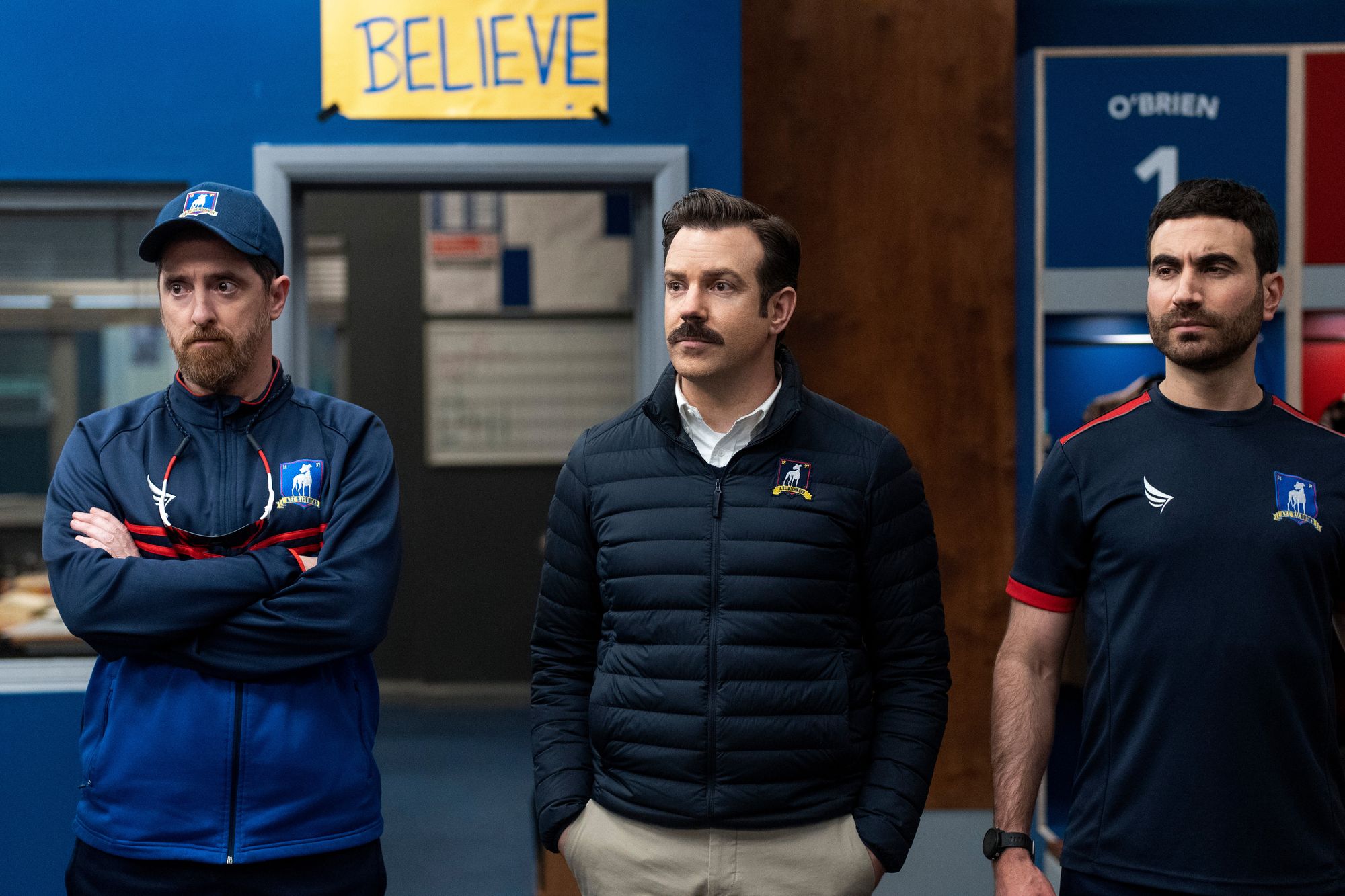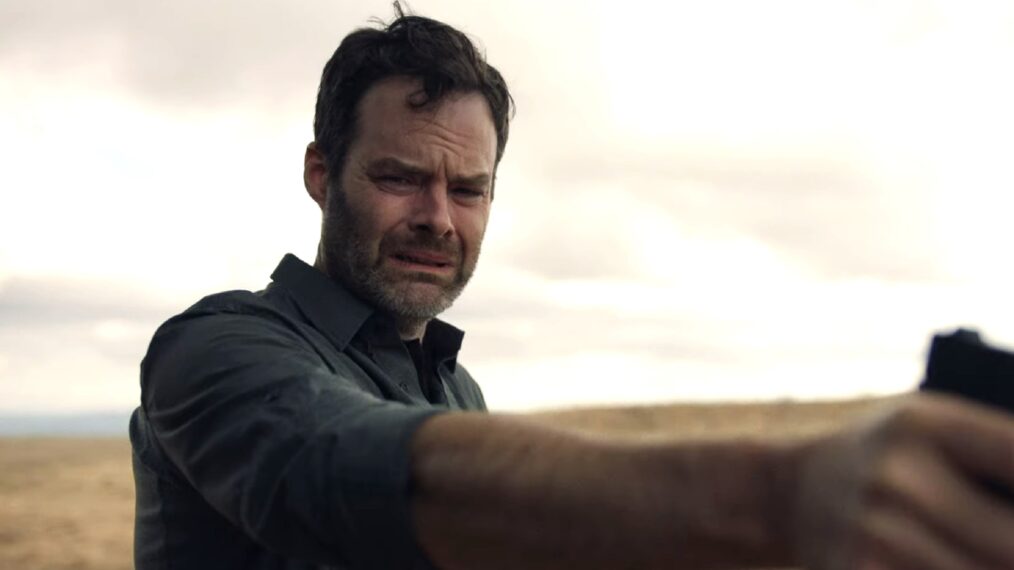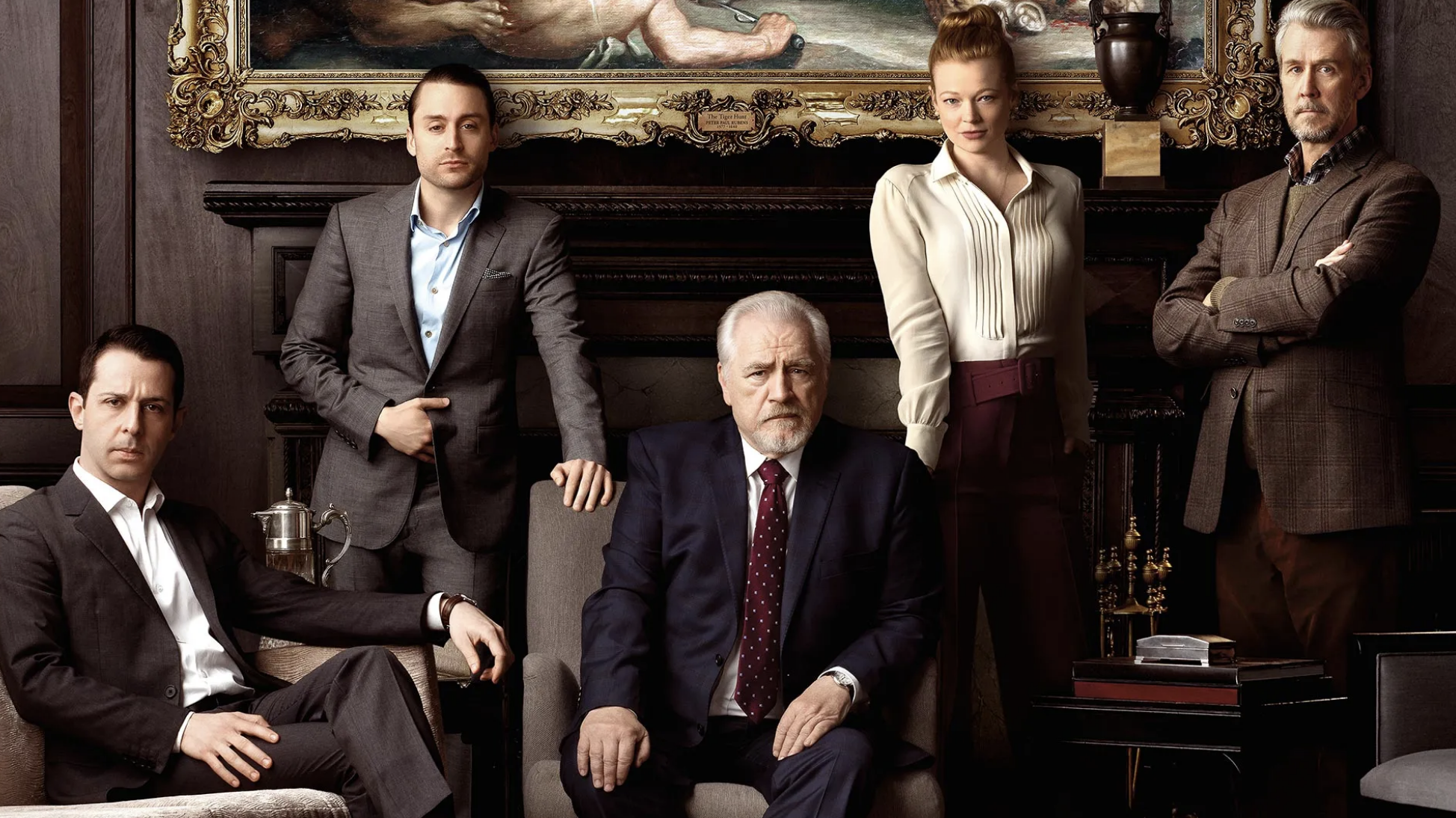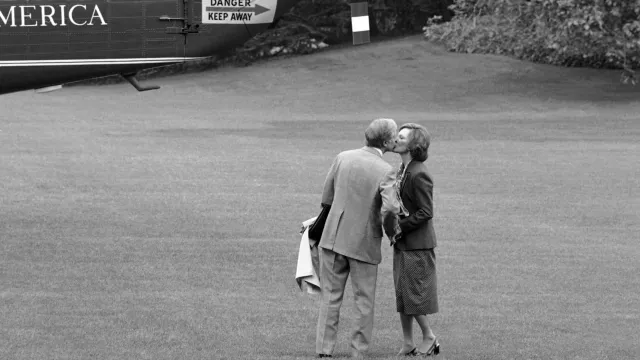Texas Outlaw Writers Newsletter: So Long, Farewell to Ted Lasso et al Edition

Last week, several high-profile, excellent "streaming" series dropped their season and series finales. (I will try to keep spoilers to a minimum, but there will be clues.) In our household, Succession, Barry, and Ted Lasso all wrapped up to a rapt-up audience.
The last show of the Ted Lasso season was fittingly titled, "So Long, Farewell," though there were some doors left slightly ajar that could easily lead to show spinoffs. I don't know anyone that wasn't at least slightly touched by this series. It could find an audience with a sports-bar crowd or just as easily (except for a little profanity and an alarming shot of the character Coach Beard in a thong,) from some faith study at a local church. Created and starring former SNL cast member Jason Sudeikis, the show was as hilarious as it was poignant. Some critics felt that it became too saccharine in its last season, but these critics are hollow, soulless elites who refuse to take Lasso's directive to "Believe."

"Barry" was a dark, OK, a completely black comedy that only grew darker over the series. (Darker than black? Yes!) Bill Hader (another SNL alum) created the series and played the lead, an Afghanistan war vet coming home with a good dose of PTSD. An old family "friend" (Stephen Root in another off-the-wall character, "Fuches,") engages Barry as a hitman for profit. During the execution of one hit (see what I did there?) Barry runs into a nondescript building in L.A., only to find Gene Cousineau (Henry Winkler) conducting an acting class. Within a few minutes, Barry has found his new calling and a girlfriend. Barry (the series) bounces between quirky characters that inhabit the dark underworld of crime/drugs and equally quirky Hollywood-wannabes. There is mayhem and murder, the FBI and drug gangs, and auditions and curtain calls. The last episode was entitled "Wow," complete with a high body count, and a flash-forward that reimagines the story through a feel-good Hollywood lens.

And then there was Succession. What a lush, sharp, well-written, well-acted tour de force this show has been. The miserable Roy kids conspire with and against each other for control of the family business - the global media empire built by their ruthless father and kingmaker, Logan Roy (Brian Cox.) The finale reveals how that deal goes down after Roy's death. (Hey, it's called "Succession" for a reason, and he's been expired for a couple of episodes now!)
From the first moments of the series, it was obvious that the show is a thinly veiled take on media mogul Rupert Murdoch and his family, (VERY thinly veiled.) Their wealth (and privilege) is obscene. The old man was a cunning titan who started with almost nothing. His kids' desire to retain and grow that power and wealth is evident, but they reveal that they are out of their depth at every turn. At times, their posing and posturing and barking business jargon at their inferiors is almost comical, until you realize how it echos so many of our real-life oligarchs and celebrities today. (Looking at you, Elon.) And yet, we can't seem to stop equating great wealth with great ideas (or business sense.)

The Roy kids are left to savagely tear at each other over the seat of family power (and maybe, somehow, their father's posthumous approval.) After all the ugliness, backstabbing, and emotional warfare, they are left hollow, yet retain their massive, unearned wealth. Brother Roman sums it up nicely, "We're bullshit."
These three series have won numerous awards over the last few years, and they will no doubt score again when the Emmys, Golden Globes, and others are announced. So well respected are these shows, that each - Barry, Succession, and Ted Lasso - have had pieces written that suggest each has Shakespearian themes, characters, or dialogue references.
There are many other fine series that are wrapping up their seasons, too. The Marvelous Mrs. Maisel, Schmigadoon, and Endeavor (PBS.) Countless others are scheduled to continue production for more seasons.
This has truly been the golden age of television. The quality of productions designed for the small screen absolutely rivals the best movies in American cinema. (Some series have crossed over between the large and small screen.) To look at classic streamers (and series) like Breaking Bad, (and the Saul spinoff,) The Sopranos, The Wire, Narcos, John Adams, Band of Brothers, MadMen, Curb Your Enthusiasm... the list goes on and on.
In thinking about the Ted Lasso finale, it recalls another Shakespeare reference... a line Billy S. wrote for his popular "Hamlet" character,
"He was a man, take him for all in all,
I shall not look upon his like again."
Good Outlaw Writer Readers, I think the Golden Age of Streaming TV is coming to a close, and it may happen fairly quickly. For three reasons.
• The Writers Strike
• The streaming platforms are having to adjust their business models as subscriber numbers are dropping. Consumers are inundated with the number of choices available.
• A few of the streaming services and production companies have merged or have been leveraged in massive buyouts leaving tremendous debt loads. Management of these services has elected to cut costs, limit new programming, and limit the inventory of archived movies/series.
The Strike
If we were to look closely at the changes that the last writers strike brought to the TV landscape, we will have a pretty good idea of what might happen now. In 2007, the strikers were out for 100 days, and network television hasn't been the same since. Writer-intensive comedies and dramas were all cut back and reality shows, game shows, provocative dating shows, and celebrity-judged talent shows took their place. Reality shows need writers, but they are usually non-union and it's a cheap way to produce an hour of TV. Lock a few participants into a house, an office, on an "island," or challenge them to some contest and provoke/encourage them to bicker and fight with each other. Game shows are also inexpensive and simple to produce. They can be upgraded to "celebrity" game shows for prime-time audiences. In the last two evenings alone, I've flipped channels only to find Celebrity Jeopardy, Celebrity Family Feud, and Celebrity Wheel of Fortune cluttering up the dial. Dating shows are also extraordinarily cheap, and as time goes on, they get more and more suggestive in their productions. I refer to them as the Pimp 'n Ho shows... "contestants" are encouraged to find the best hook-up partner out of a field of applicants. Then they get a rose or maybe a free trip to an all-inclusive resort where they get a chance to "explore their feelings" for each other. ("Inclusive" also includes any needed STD remedies.) Celebrity-judged talent shows are also easy on the budget and sometimes allow audience participation in picking winners.
Displaced during the last strike were sitcoms, dramas, soap operas, police procedurals, and medical dramas. And when the strike broke, many of those shows never came back. In addition to the expense of writers, actors, large crews, multiple locations, etc., it's expensive just to produce a pilot and see if the chemistry works among a cast with a given concept. Many pilots are produced and few are chosen. And often, networks must invest in a low-rated season or two as a show (hopefully) finds an appreciative audience.. (Seinfeld produced only 4 shows for their first season as it struggled to find an audience and a time slot.)
Most (network) shows today are low-budget and there is very little risk taken these days in producing anything cutting-edge or out of the mainstream. News shows and documentary-style programming is popular. Dateline, 20/20 and the like expanded even as their content cheapened. Long ago they were interesting and topical. Today, they are mostly murder/love triangle formula mysteries. A murder podcast with b-roll.
Netflix came along and changed everything, draining more eyeballs away from network and standard cable television. As Netflix profits soared, they began to produce their own movies and series. HBO and some paid cable outfits were producing original programming, but Netflix put their own content online. The money rolled in as cable cutters, looking to shrink household expenses, divorced themselves from cable TV. The premium channels quickly developed streaming capabilities as well, and cable networks followed suit. The business model was to offer dazzling content and capture viewers. Budgets were fat - the rush was to count subscribers as opposed to balance income with the production budgets. Great programs would pay dividends down the road and for years, so the thinking went.
So logically, writers should have been making a lot more money - more projects, bigger production budgets, and viewers returning regularly to view archived programming (generating more royalties.) Well. No. The way the contracts are structured, writers actually are making less money than they used to. There was more content overall, but fewer long seasons on the books. A streaming series might consist of 8 episodes for a season. There may be only one season produced - or maybe four, who knows? With a traditional sitcom or network drama, a network might order 26 episodes from an 8-member writers' room. At first, Netflix and others threw a lot of money around, looking for hits and blockbusters. But how many series become blockbusters out of the hundreds produced? How many do you care to watch? The studios began to scale back their writers' rooms to a smaller handful of writers working those shorter seasons. As of late, writers complain that the producers are also resorting to "mini rooms" for writers. Handing maybe 4 writers a simple treatment or concept, and asking them to rough in some script ideas. This pays a bare minimum and the producers pick and choose what they might further develop - paying another mini room a minimal fee to "sweeten the script."
As for royalties, the old model allowed for TV series to be sold to the network, then negotiate for reruns, then to a cable stations for multiple seasons, and then to DVD sales. With streaming, there is none of that. There is usually one producer and that producer is also the streaming platform. The royalty formula is not generous and currently, Netflix (and others) are culling their archives so they don't have to face back-end royalties at all.
As a result of these structural changes, it is difficult for young writers to grow with experienced mentors and get time on an actual set. Their short contract obligations result in the constant search for paying work as opposed to developing skills, workshopping treatments, or crafting long-form scripts that they can sell, etc. It's become a desperate gig economy, like so many other professions.
And did I mention AI? Producers are not even hiding the fact that they intend on using AI to develop story ideas and outline dialogue. Sound unrealistic? How many Hallmark Christmas movies would you need to enter into a database before you could instruct a computer to change the color of the flannel shirts, make the love interest own a Golden Retriever instead of a Lab, and have the protagonist open a Christmas Tree farm instead of a cookie bakery? Sure, you wouldn't get ultra-original, cutting-edge series like "The Office," but hey, we need to add a dozen new Hallmark Christmas Movies to the schedule.
The Business Model
As mentioned, for a long time it was a numbers game. Sign up customers and make compelling content that attracts more subscribers. Good, quality content with A-list actors, directors, and crews. Pay the writers to come up with great treatments and scripts.
Every studio saw this happening. Netflix was crushing it. When HBO put its library online, it opened up a whole new market and they didn't have to rely on cable carriage. Network TV was now mostly cheap programming and sports. For a number of reasons, cable TV was dying. The cable networks and movie studios saw the writing (and the money) on the wall. Sell direct to the consumer. A few groups (like YouTubeTV, Sling TV) were even putting their own very customizable programming packages together to deliver online to subscribers.
The Pandemic was a gift to streamers. People were captive at home, desperate for entertainment. Subscriber numbers went through the roof and there seemed to be no limit to how many services the market could bear.
But of course, there was a limit. Consumers escaping high cable bills were finding that they could easily equal or exceed a monthly cable bill by adding streaming service after streaming service. Even the professional sports leagues were beginning to offer game packages for cable cutters, adding even more competition for a finite entertainment dollar.
And finally, the pandemic wound down. People went back out into the world and spent less time in front of the TV. Work-from-home arrangements fizzled as employers called employees back to the office.
And then, the unthinkable. Netflix announced in 2022 that they had lost a couple hundred thousand subscribers in their first quarter. By the second quarter, they'd lost a million. They blamed a recent price increase and competition in the market. By then, Apple TV, HBO Max, Amazon Prime, Disney+, and more were all in a race to attract more and more subscribers. Keep in mind the popularity of YouTube (free,) and TikTok (also free.) Ask any parent what is more popular at home, one of the many animated streamer series for kids? Or hours and hours of free Tik Tok?
But the Netflix loss struck hard. Wall Street freaked, and the layoffs and cost-cutting followed soon after.
In addition to the previously mentioned structural problems that affected writers, studios scaled back upcoming projects, even ones that had already been green-lit. Some series were on the board for renewal but those decisions were reversed. In the future, there will be even less risk, less innovation, and less time for a show to build an audience.
Mergers/Buyouts and debt load
Discovery paid $43 billion to acquire WarnerMedia from AT&T to create Warner Bros. Discovery. It's been a rough ride. In a statement from WGA: “WarnerMedia and Discovery promised that their merger would allow the new company to invest in more original content and create more opportunity for underrepresented storytellers...Less than one year after the merger’s close, Warner Bros. Discovery has laid off hundreds of workers and canceled, pulled, or written off $2 billion in content, spotlighting the predictable harms of consolidation.”
Hell, it was just four years ago that AT&T closed its $85 billion deal for then-Time Warner. Seems like AT&T bailed out pretty quick, and at a bit of a loss?
This new WarnerBrosDiscovery behemoth has already started up and folded CNN+, a paid CNN premium service that did not attract subscribers. (Um, who thought paying for a CNN product was a good idea? Someone is gonna pay to see more Wolf Blitzer???) Also: see Jim Moore's story linked below. **
Warner Bros. Discovery’s market cap is only $28 billion. Their debt load is about 50 billion, and currently has a negative net profit margin. Not to worry, David Zaslav, CEO of Warner Bros. Discovery Inc., was paid $498,915,318 between 2018 and 2022, according to a Times analysis of executive compensation at 10 publicly held media and entertainment companies.
Seriously, are Logan Roys' kids making these deals? Same mentality, same (lack of) business sense. Certainly not a whit of empathy for working stiffs.
This is why the Golden Age of TV may be dying. Warner Bros./Discovery/HBO/CNN/Cinemax can pay David Zaslav, a Logan Roy lookalike-executive a half billion dollars over five years only for him to cut their stock price in half, but they can't pay writers wages that rise above the level they were paid in 2017 to create popular content like Succession and Ted Lasso.
A bit of Ted Lasso Trivia: Jason Sudeikis claims that Lasso was inspired by the famous Trump escalator ride. Sudeikis had created a character named Ted Lasso for a skit, but the character was rather "belligerent." Modern politics made him rethink that.
"...why make the new version so warm and fuzzy? “It was the culture we were living in,” explains Sudeikis. “I’m not terribly active online and it even affected me. Then you have Donald Trump coming down the escalator. I was like, ‘OK, this is silly,’ and then what he unlocked in people… I hated how people weren’t listening to one another. Things became very binary and I don’t think that’s the way the world works. And, as a new parent – we had our son Otis in 2014 – it was like, ‘Boy, I don’t want to add to this.’" -The Guardian
A couple of months ago, the entire Ted Lasso cast was invited to the Biden White House for a nice photo op that served the purpose to promote Biden's effort to create a kinder and gentler nation (and to discuss mental-health strategies.) Sudeikis had been to the "fake" Oval Office numerous times on SNL, but he was quite surprised to see that in the real White House...
Someone – presumably not President Biden himself, but you never know – had taped up a blue and yellow sign reading “BELIEVE”, the motto of AFC Richmond, above the door to the Oval Office. -The Guardian
One more final bit of Lasso/Trump Trivia: There was another horrible reality show that came about as a result of the last writers strike. "The Apprentice" had been airing for a few seasons (and ratings were dying.) If you recall, a certain tangerine-hued, former New York real estate developer hosted that show. (Does the phrase, "You're Fired!" ring a bell?) In 2007, a new entertainment chief hit NBC and decided to revamp/rebrand the show, invite stars to participate as contestants, and call it "Celebrity Apprentice." It was a good move as far as ratings go. The show grew in popularity, and the lack of alternative new shows on the schedule drove an audience to "Celebrity Apprentice." And to Donald J. Trump.
More than one pundit has suggested that without "Celebrity Apprentice," there would have been no President Trump.
So, dearest WGA writers, let's get this settled. Please? We really don't need another celebrity game show host world leader.
A great segue - Jim Moore reports this week on the disruption and possible dismantling of what is left of CNN. Jim outlines a great backstory of CNN's early days and how it was such a (positive) disruptor in television news. As mentioned above, Warner/Discovery owns CNN, and David Zaslav is the CEO. Zaslav picked Chris Licht to run CNN. His resume includes a good run at CBS News as well as the Colbert Report.
In our highly partisan country, CNN has repeatedly stumbled while trying to maintain some sense of journalistic integrity. After the recent live Trump pep rally that they engineered, Zaslav, Licht, and their investor enablers have set the place on fire.**

Our own Ted Lasso, Roger seems to be on a sensitive jag lately and is now all misty-eyed about the 70's. But in this case, it is in defense of an ordinary man in extraordinary times. He didn't always succeed, and in fact, only had a couple of big wins, but through it all Jimmy Carter maintained his decency in an indecent profession.

Is it possible for the collective sins of man against the environment to reach a breaking point with Mother Nature? Myra Jolivet wonders if the animal kingdom is capable of exacting revenge.

Still need something to read? Don't miss the Atlantic's expose on the inner workings (and non-workings) of CNN. This piece was referenced in Jim Moore's piece, and further outlines the kind of trouble Warner/Discovery is in.
Also: Beware of the hemlock. You're not Socrates. Live to garden another day.
A former gun company executive gives away their secrets... and the root of America's obsession with firearms.
**UPDATE: Right after this newsletter hit your inbox, Chris Licht "stepped down" at CNN. From Reuters: Chief Executive David Zaslav wrote that the company will be conducting a wide search, internally and externally, for a new leader. “This job was never going to be easy, especially at a time of great disruption and transformation, and Chris poured his heart and soul into it," Zaslav wrote. He added: "Unfortunately, things did not work out the way we had hoped – and ultimately that’s on me.”
Nice mea culpa from Zaslav. But if it's truly "on him," why does HE remain at the helm making hundreds of millions of dollars?
